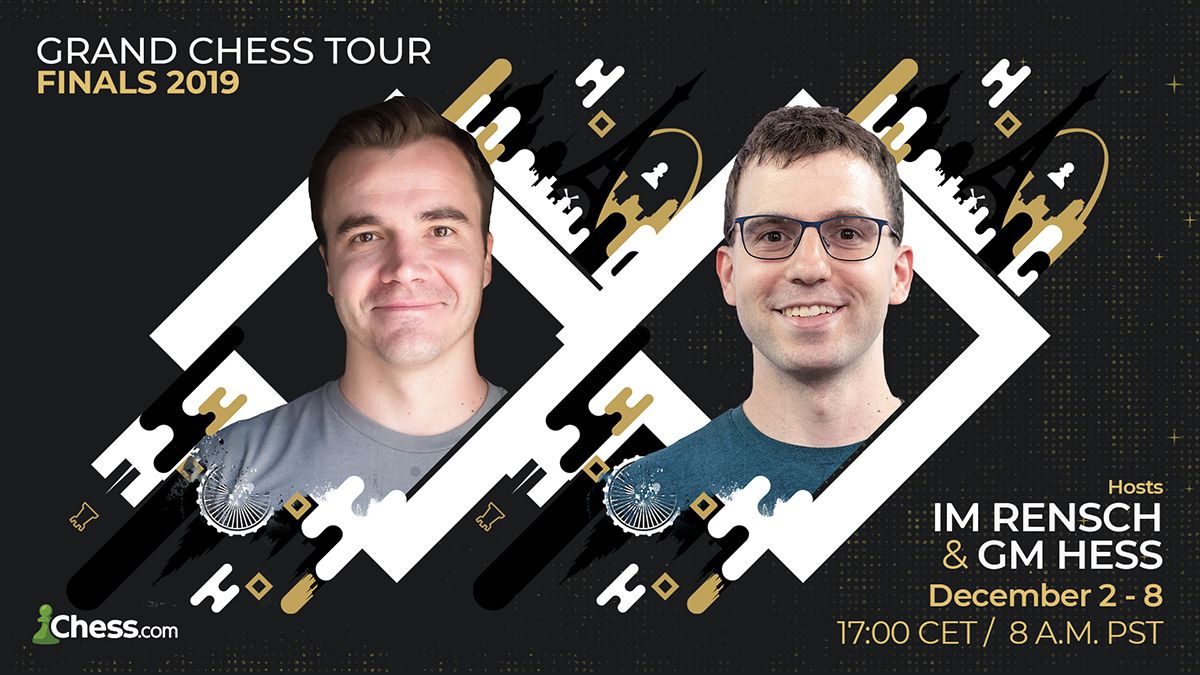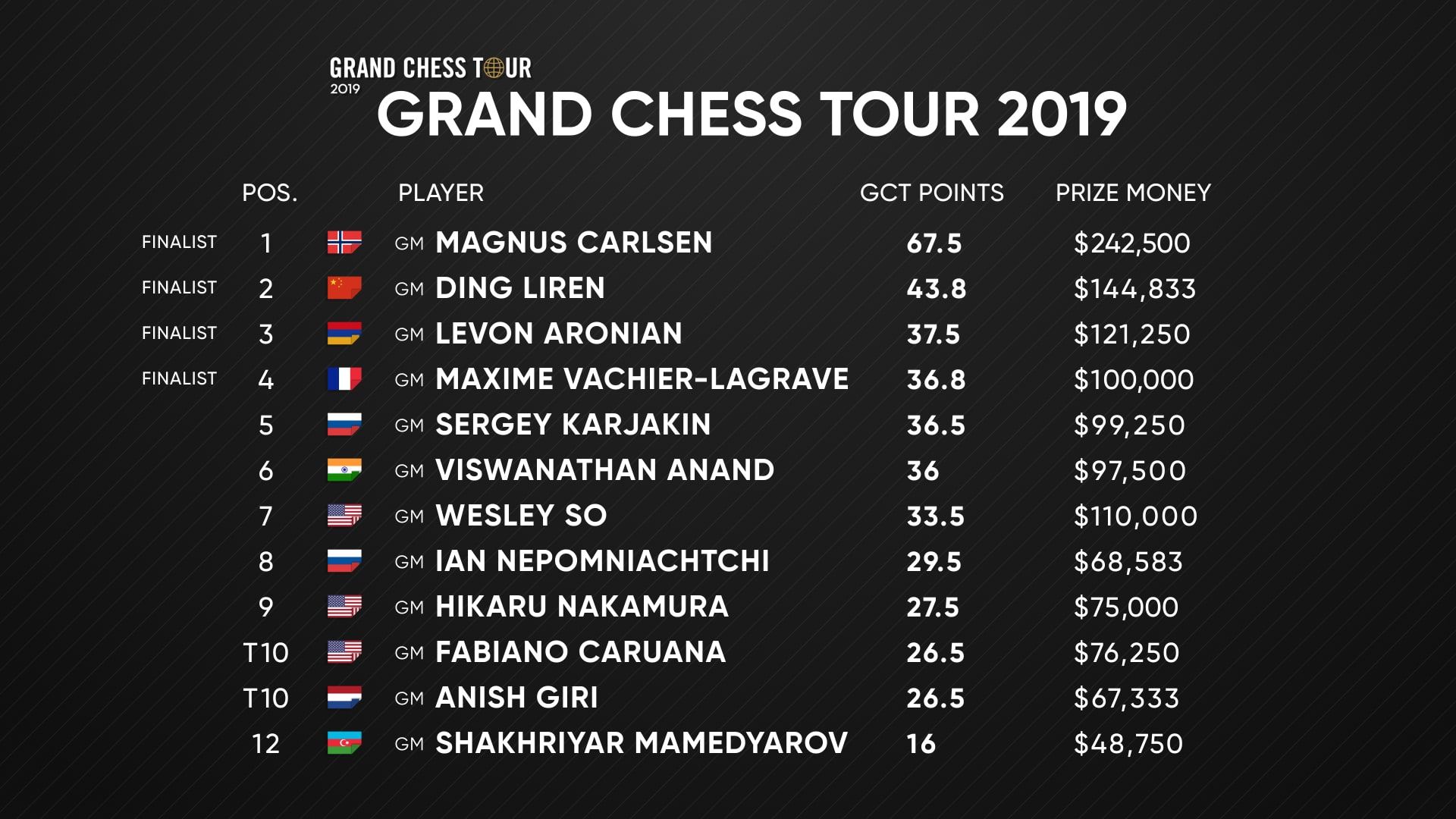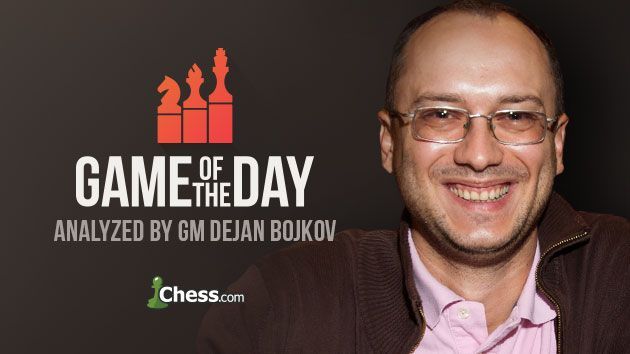
2 Draws, 1 Spectacle As Grand Chess Tour Playoff Starts In London
The Grand Chess Tour's playoff took off on Monday in London with two draws. Whereas Levon Aronian and Ding Liren started quietly, Magnus Carlsen and Maxime Vachier-Lagrave played a tactically complicated Sicilian that "confused" the world champion.

The Grand Chess Tour playoff starts each day at 17:00 CET, which is 11 a.m. Eastern and 8 a.m. Pacific. You can follow the games here as part of our live portal. Commentary is provided by GM Robert Hess & IM Danny Rensch at Chess.com/TV.
The London playoffs are the culmination of a long season in the Grand Chess Tour, which started with the rapid and blitz tournament in May in Ivory Coast, and ended recently with the Tata Steel Chess India rapid and blitz in Kolkata, India. The final standings of the tour are as follows:

The top four players are now competing in the finals at Olympia in Kensington, London, as part of the London Chess Classic for a $150,000 first prize on top of their earnings so far.
The tour combined standard, rapid and blitz chess and it's the same for the playoff. First, two standard (classical) games are played, with the unusual time control of 130 minutes for the whole game plus a 30-second delay per move. The third day will see two rapid games (25 minutes plus a 10-second delay) and up to four blitz games (five minutes plus a three-second delay).
As in the previous events, the scoring system is different for the three time controls. On the first two days, a win gets you six points and a draw three points. Then it's four points for a rapid win, and two points for a blitz victory.
At the technical meeting on Sunday evening, the drawing of lots was performed, and resulted in the semifinals Carlsen vs. Vachier-Lagrave and Aronian vs. Ding.

The game between the Norwegian and the Frenchman was both a wonderfully played and tough fight. Although the players hardly made any big mistakes, they were nonetheless critical of their play afterward.
MVL, who had some rest before this event as he didn't play in India, got surprised by Carlsen early in the opening. In a Sicilian Najdorf, the world champion played 6.Bg5 e6 7.f3!?—a "system" that had only been played once before by a 2600+ player: Sergei Tiviakov. It's unlikely, however, that Carlsen has been studying the Russian-Dutch GM's games in order to figure out how to reach 110 games unbeaten!
"I wanted to try something new, get some positions that he is not that familiar with. I think that succeeded fairly well," Carlsen explained.
Black played 7...h6 and after 8.Be3 his pawn on h6 was an extra tempo in the starting position of the English Attack. As Vachier-Lagrave soon went ...h6-h5, he lost that tempo, but at least White's typical pawn push g2-g4 was prevented.
Interestingly, the French GM explained that if he had allowed g2-g4, his counterplay on the queenside would have been too slow thanks to White's a2-a3, a move amateurs wouldn't easily make after castling there.

Then, on moves 14, 15 and 16 Carlsen spent an hour in total as he had to come up with the correct piece setup moving forward. Everything depended on whether another typical pawn push was possible: Black's ...d6-d5.
MVL did go for it, which involved a pawn sacrifice on e4. During the game, Carlsen thought it was just good for White, but the computers pointed out that Black could have gained a strong attack based on a particular idea missed by the players. (See Dejan Bojkov's annotations below for that.)
"In the game somehow I didn't really believe what he was doing," said Carlsen. After playing his 27th move he thought he was winning but right after that, the players repeated moves in a position that was still quite sharp.

Vachier-Lagrave said he "could have played better at critical points." Carlsen pointed out that both the wild complications in this game and the (minor) tactical slips didn't come completely unexpected.
"It goes with the choice of opening," said Carlsen. "Clearly when you play that way with no forced lines at the beginning and castling on opposite sides, then it's going to be complicated. In such cases we often make some mistakes as well. That's the way it is."

The other game was much less captivating. Aronian and Ding drew their game after about 1.5 hours, and little happened there.
The Armenian player showed his peaceful mindset as early as move five, when he went for a solid sideline that fianchettoed the king's bishop instead of playing his king's pawn. Ding was still well prepared, and drew comfortably.

"I had a really bad sleep so I felt I just got to play safe," Aronian explained. The Armenian GM pointed out that he is suffering from jet lag after coming back from India. "It's like a fog. It has to pass, and then you fight," he said.

A quick draw was Aronian's game plan because of lack of sleep, but it came a day after the Armenian GM had announced his withdrawal from the Jerusalem Grand Prix later this month—like FIDE World Cup winner Teimour Radjabov had done shortly before—due to medical reasons:
1/3 After thoughtful consideration and with the permission of FIDE president Mr. Dvorkovich, I regretfully have to withdraw from the FIDE Grand Prix in Jerusalem. Unfortunately, the dates clash with the treatment of my exhausting and troublesome breathing problems related to.. pic.twitter.com/VzQcYOeEuK
— Levon Aronian (@LevAronian) November 30, 2019
The second standard game will be played on Tuesday, followed by rapid and blitz on Wednesday.
The Grand Chess Tour playoffs are part of the London Chess Classic festival, which also includes the annual open tournament where six players currently lead. Among the leaders are the young GMs Anton Smirnov (Australia) and Praggnanandhaa Rameshbabu (India).

Another big event in the festival is the British Knockout Championship, with Michael Adams, David Howell, Gawain Jones and Luke McShane. These players follow the same format as the GCT playoffs, and so they also started with a classical game on Monday in the semifinals Adams-McShane (a draw) and Jones-Howell.
In the latter game, Jones missed two clear wins and then should have drawn the game that he ended up losing:


